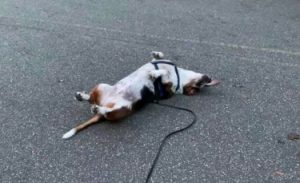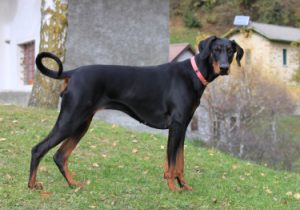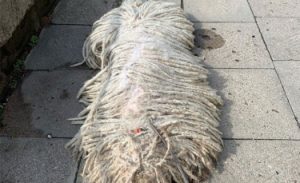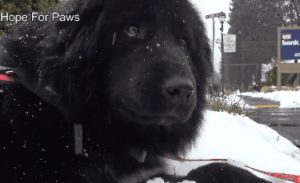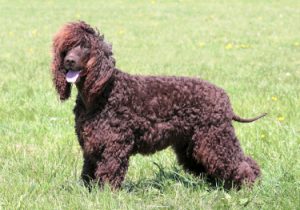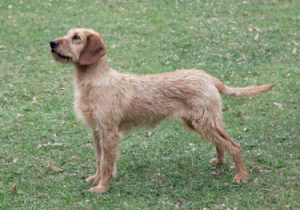Other names: Dogo Argentino, Argentine Dogo
The Dogo Argentino is a large dog, which has a balanced and harmonious appearance. Powerfully muscular, he is a massive mastiff type Molossoid without being heavy. The Argentine Mastiff, also called Dogo, has been a very popular dog in France since its importation in the 1970s. A hunting dog, it is above all a great life companion for families. He is gentle, affectionate, requires tenderness and presence. He is faithful, loyal, and above all little barker. He is an excellent protection dog. In addition, he does not require any particular maintenance, except to be often by his side, because he does not support loneliness.
<!–
–>

| Short | |
| Argentina | |
| Giant | |
| Square |
| Sex | Weight | Cut |
|---|---|---|
| Female | From 40 kg to 43 kg | From 60 cm to 65 cm |
| Male | From 40 kg to 45 kg | From 60 cm to 68 cm |
Dogo Argentino to adopt
-
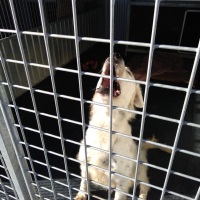
monzon
Vienna (86)
9 years and 9 months
History of the breed
The Dogo Argentino comes straight from the region of Cordoba, Argentina. It is thanks to Dr Antonio Nores Martinez that this breed of dog was born. He was a surgeon in the first half of the 20th century.
He decided to cross an old fighting dog from Cordoba ( perro de pelea cordobès ) himself from a cross between Mastiffs, Bulldogs and Bull Terriers. The dogs used for breeding were all completely white. This drastic and precise selection allowed the doctor to create different lines. Thus, the Cordoba fighting dog was itself crossed with a German Mastiff to sublimate the head, a Dogue de Bordeaux, a Pointer and a Boxer.
The Argentinian Mastiff standard was established in 1928. At first it was used as a fighting dog. The doctor was convinced that it could be used during hunting parties. So in 1947 he took his best cock to the Buenos Aires Hunters Club for a demonstration. A fine sense of smell, impressive muscles and very good endurance convinced the most skeptics.
It arrived in Europe in the 1970s, first in Italy and then in France, where it became very popular. The Fédération Cynologique Internationale recognized the breed on July 31, 1973.
Dogo Argentino Pictures
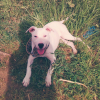
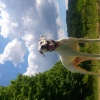
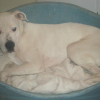
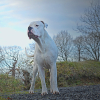
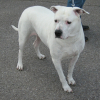
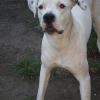
View all photos of Dogo Argentino from Woopets members
Physical features
His hair : short and smooth.
Its color : entirely white with sometimes a few black spots around the eye.
Its head : it has a convex shaped skull, with jaws with extremely developed muscles, which gives it a powerful bite.
His ears : high and drooping, they were once cut off, which is now prohibited.
His eyes : dark, they oscillate between very dark black and hazelnut brown. They are wide apart and almond shaped.
His body : massive and powerfully muscular, but harmonious.
Its tail : long, it falls to the hock: it becomes thinner as you approach its end.
Behavior and character
| Affectionate | |
|---|---|
| Calm | |
| Protective | |
| Independent | |
| Hunter | |
| Barks / howls |
Behavior with others
| Cohabitation with children | |
|---|---|
| Sociable with other animals | |
| Love strangers |
The fruit of careful crossbreeding, the Argentinian Mastiff is endowed with an extremely rare psychological balance. He’s very smart. He is very faithful and loyal to his master whom he will defend from all possible dangers. He is calm and not very barking . It is perfect for a family with children , if it was used to being around them in his youth. It will thus be a perfect playmate . He is courageous, pugnacious and will always be on the alert .
Thus, he is excellent in the role of protective dog . He is endearing and needs tenderness and attention to be fulfilled. What’s more, he appreciates the presence of other animals. He tends to want to dominate his fellows. Be careful, his imposing physique and the power of his bite can make him a dangerous dog if placed in the wrong hands. It is an excellent guard and defense dog .
The Argentine Mastiff
is it right for you? Take the test!
Education
| Clever | |
|---|---|
| Obedient |
Perfectly adapted to family life , the Argentinian Mastiff needs a careful and strict education . He easily complies with the rules that are imposed on him. They must be coherent and instilled with firmness, but not brutality. It is not recommended to stimulate his aggressiveness. On the contrary, you have to curb your enthusiasm. He may be more distant with strangers . As long as it has been socialized from an early age, it cohabits more easily with other animals.
Puppies tend to be shy when they arrive in their new family. It is important to make him social as soon as possible, especially with children . He must learn to play with them and feel their presence. The Dogo is a mastiff and, as such, he can be stubborn .
He must feel completely safe in order to follow his master’s orders to the letter. Getting help from a professional in dog clubs can be a great idea in order not to make mistakes and to ensure the good training of a dog who likes to learn as long as it is lovingly educated .
Living conditions
| Suitable for apartment living | |
|---|---|
| Good for new masters | |
| Love it hot | |
| Love the cold |
The Dogo Argentino adapts very easily to its environment , but it cannot live in an urban environment without a large garden and very frequent outings. He supports loneliness if he has been used to it, even if it is contrary to his temperament. He needs a lot of physical activity. He lives as calmly in a house as he does outside, except in the winter in very cold and snowy weather when he needs shelter. Apartment living is not necessarily recommended, unless it can be taken out several times a day.
Health
| Solid | |
|---|---|
| Ease of gaining weight |
The Argentine Mastiff is a rustic dog, rigorously selected and which is the subject of numerous crosses to avoid inbreeding . The puppy should be watched carefully until adulthood to prevent possible developmental problems . Adapted to harsh conditions, robust and blessed with excellent genetic diversity , this breed presents few health problems.
As in other breeds of dogs, the white color is due to a gene responsible for a predisposition to deafness, neither rare nor frequent, normally detected from the age of 3 months (check with the breeder). Finally, because of a fairly fine hair, exposure to too long a scorching sun can cause it to heat up.
Hypoallergenic breed
No
Litter size
Between 6 and 8 puppies
| Major concerns |
|
||||
| Minor concerns |
|
To protect you from these risks and insure your companion in the event of health problems, Woopets advises you to take out Dogo Argentino dog insurance .
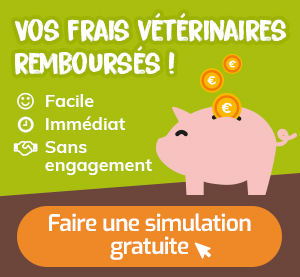
function showAssuranceForm () {var siteReferer = var id_race_association = ‘231’; //console.log(id_race_association);success: function (html) {}});}document.addEventListener (‘DOMContentLoaded’, () => {$ (‘# assuranceModalBanner’). on (‘show.bs.modal’, function (event) {showAssuranceForm ();});});
Life expectancy
Minimum: 12 years old
Maximum: 14 years
The life expectancy of an Argentinian Mastiff is, on average, between 12 years and 14 years.
Calculate the human age of your Dogo Argentino!
To choose… 1 year 2 years 3 years Four years 5 years 6 years 7 years 8 years 9 years 10 years 11 years old 12 years 13 years 14 years old 15 years old 16 years old 17 years 18 years old 19 years old 20 years 21 years old
Maintenance and hygiene
| Ease of maintenance | |
|---|---|
| Cost of maintenance | |
| Hair loss |
| Drool level | |
|---|---|
| Ease of grooming |
Its maintenance is very easy . It is an outdoor dog that has few needs, apart from a demanding food intake during growth. His energetic and playful temperament is then coupled with an exceptional muscular development.
Weekly brushing may be sufficient, possibly with a bath every 4-6 months . The length of the coat may vary depending on the climate. In temperate zones, it is longer, with a possible undercoat which requires more frequent brushing.
His eyes and ears should be checked often to make sure there is no trace of dirt or any infection. Her teeth need to be brushed regularly to eliminate tartar build-up and the proliferation of bacteria. If they don’t wear out naturally, her fingernails need to be cut. If you are new to this, it is recommended that you seek advice from a veterinarian.
Price and budget
Purchase price
Mini
800 € Maxi
1400 €
The purchase price of an Argentinian Mastiff is between € 800 and € 1,400.
Annual maintenance cost
Mini
€ 1,750 Maxi
€ 1,800
The annual maintenance cost of an Argentinian Mastiff is between € 1,750 and € 1,800.
Name ideas for an Argentinian Mastiff
| Male |
|
| Female |
|
None of these proposals suit you? Use our tool to find the name of your Dogo Argentino!
Food
The diet of the Dogo Argentino should be carefully monitored, especially at the beginning of his life. He grows quickly and must have a diet adapted to his morphological change. Indeed, a bad diet has repercussions on the dogo’s articular or muscular problems. Croquettes specially adapted to the weight of the Dogo can be found in specialized stores. Do not hesitate to ask for advice on the rations to give him.
Want the best for your dog?
Create tailor-made food for your Dogo Argentino
I discover !
PROMO -30% | Delivered to you!

Physical activity
| Athletic | |
|---|---|
| Energy level | |
| Potential to play |
Even if the Dogo’s physical activity must be controlled, especially at the beginning of his life, he is nonetheless an active and sporty dog . He enjoys long walks in the company of his master, but also accompanying him in his joggers . This breed of dog needs a lot of exercise and mental stimulation , especially to keep them from getting bored and developing destructive behavior.
Famous Argentinian Mastiff dogs
Bombon : this is the name of the four-legged character in the film Bombon the dog , directed by Carlos Sorin and released in 2004. The dog, played by the Argentine Mastiff Gregorio , was given to Juan by a young woman to thank him for helping it out on the road. The man becomes a dog exhibitor.
Competitions
| Classifications & Standards |
|
Others
| Master character <span class="btnTooltip qTip2" title="- Calm: the master must be gentle and know how to show patience. – Active: the owner must be energetic and dynamic to live in harmony with his dog. – Hyperactive: the owner must be stimulating and very restless to suit the temperament of his dog.”> |
Active |
|---|
We talk on the forum
ADOPTION OF AN ARGENTINE DOGUE
Message from sylvie paturel
your dogue de bordeaux
Message from DOGUEETBOUVIER
My great dane only wants to drink from my tap
Guest message
dogue de bordeaux
Message from Valerie Chevalier
Change of dogue de bordeaux croquette
Guest message
Do you have a question about the Dogo Argentino?
Do not hesitate to ask Woopets visitors for advice on the forum!
FCI Information
FCI No.
292
FCI Group
Group 2: Pinscher and Schnauzer – Molossoid and Swiss Mountain and Cattle Dogs and other breeds
Recognized by FCI
Since 1973
</div



